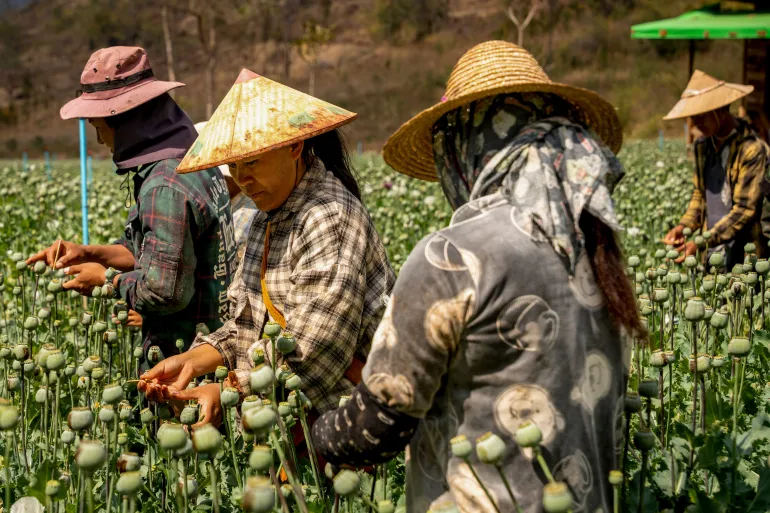Mayanmar: PonteSud – News Desk
Tian Win Nang squats on the hard-packed earth, balancing a kilogramme (2.2 pounds) of chocolate-coloured raw opium in each hand like a human weighing scales.
“Each kilogramme is worth around $250,” said Tian Win Nang, wearing worn white flip-flops and a black T-shirt.
The son of poppy farmers, Tian Win Nang appears to be barely out of his teens.
“Chinese traders pay us in advance for the harvest,” he said, showing Al Jazeera three dinner-plate-sized mounds of opium.
“We don’t know what happens after,” he says of the journey that will see the opium go “north to the labs” where it will be processed into morphine and eventually refined into heroin.
The sun is high and the air is still in the poppy fields blanketing the hills in this part of southern Shan State in eastern Myanmar.
Men and women, young and old, their faces shielded with scarves and straw hats, move with quick, practised motions as hands use sharp tools to score green poppy pods before silently progressing on to another plant.
A milky fluid slowly oozes from the wound inflicted on the pod. When it has dried to the consistency of gum, the same hands will scrape off the sticky substance, gather it together and leave it to dry in the sun until it reaches the toffee-like consistency of raw opium.
This is a daily ritual for many farmers in this part of Shan State near where drug shipments have flowed along these mountain roads near the town of Pekon for decades. The routes wind towards the borders with neighbouring Thailand, Laos and China.
Armed conflict between Myanmar’s military and ethnic armed organisations in these regions has fuelled opium farming and drug production for generations, but the trade has surged in step with the country’s intensifying civil war.
Alliances have long existed, experts say, between high-ranking Myanmar military officers, ethnic armed groups, local criminal networks and transnational syndicates that handle the drug trade’s logistics, refining and distribution.
“Drug trafficking in Myanmar has been facilitated by the military since the 1990s,” said Mark Farmaner, director of the London-based Advance Myanmar charity and an expert on Southeast Asia. “Many officers profit personally, and the institution as a whole reaps political advantages,” he said.
One of the most powerful regional syndicates is Sam Gor, a sprawling network made up of an alliance of rival Chinese triad gangs that operates across China, Myanmar, Laos, Thailand, Cambodia and beyond.
Not too far from the prison, the civil war grinds on in Myanmar as the military regime buys more advanced weaponry, and the rebel forces try to hold out and extend their advances.
The military’s air raids, drone strikes and artillery fire hammer schools, hospitals, homes and religious sites, turning entire villages into targets.
Yet, even under fire, here in southern Shan State, some appear to be trying to staunch the flow of drugs.
With limited resources, they tell of doing what they can in another battle inside a much larger war.







